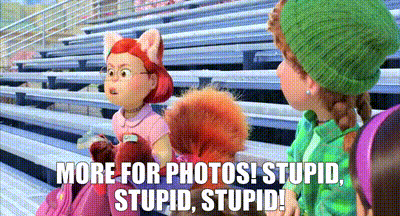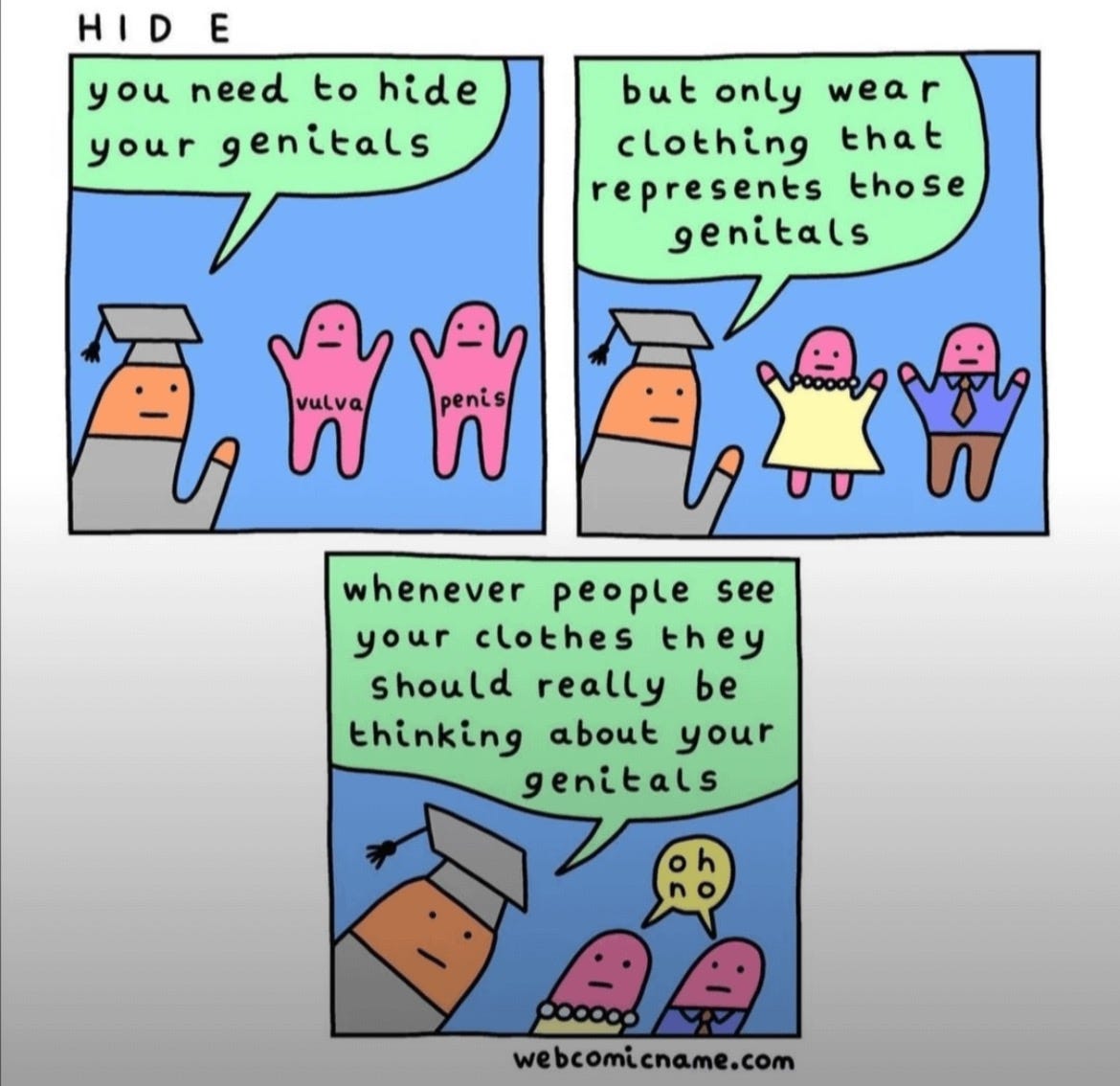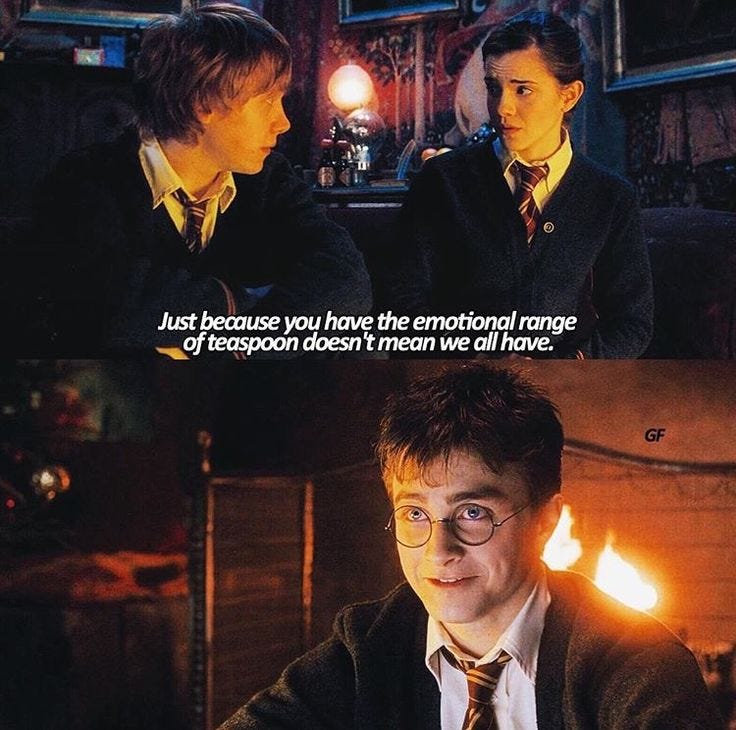The Boy Box & Why It’s Problematic
90: a pondering on the sporty, tough boy expectations that lead to disregulated men who suffer and bring everyone else down with them
When I was pregnant the first time around, we waited to find out the gender until birth.
We didn’t wait this time.
I’ve done my waiting— months of not having blood tests, not knowing if there’s a heartbeat, and going a little bit more crazy every day... I didn’t want to wait anymore.
Gender and the expectations that come with gender labels are a touchy subject for me. I really want to be so inclusive and open-minded that I don’t have any emotions either way: boy or girl.
But I do.
I wanted a girl. And why? Just because we have a boy already? Like I needed one of each? Is the gender of my children really a “gotta catch em all” situation?
I fight with myself all the time on the perceived and experienced differences between boys and girls. Did I believe there was a difference? Or did I just want Daddy/Daughter Dances as well as Mother/Son Dances? Is the gender binary sewn so deeply into our world that we can’t get out of it? Even if I left the Evangelical Christian Church, does my brain still need to operate in the rigid, unchanging system in which I was taught?
My black-and-white thinking kicked into high gear when the severing of my faith happened last year and it made me want to resist anything that made me think of my old church. Everything that felt like it in the slightest was mentally marked as possibly evil and avoided as such.
But this type of thinking was keeping me from acknowledging the spectrums within all of these topics. There wasn’t a right answer.
I’m just so used to there being one right answer.
I guess having both a boy and a girl would give me my own experience on the natural tendencies of each gender, but even then, it would only give me two distinct examples. I just thought that if I knew gender was a spectrum, the gender of my future child shouldn’t matter to me at all.
If I was as inclusive as I claimed to be, why was I hoping for a certain gender? I didn’t have any expectations for them to be a certain way…
Was it just because the girls clothing section gets so many more fashion choices??
I guess I get stuck somewhere in between “gender shouldn’t matter” and “well, gender does matter right now and we need to protect those who are hurt in our current system.” I don’t want to play into gender stereotypes and force my children to fit into the boxes society wants them to fit in, HOWEVER they will be living within this society regardless and will be affected by it, no matter how accepting and open I might be. I’m just having a hard time accepting that I lack control.
So, perhaps I am excited to share my life experiences living as a woman with a daughter, as she would probably experience many similar life events. I have wisdom to share and comfort to give regardless of gender, but I do have a lot of experiences that people who grew up as women can bond over.
I have talked plenty before about how women aren’t treated well by society, and many other more talented writers on here have as well, but an article that stands out to me is one I read recently: an article about the lack of support mothers receive and the downfall of caring communities. Funny enough, my most liked post/note on Substack was about this very topic.
And it made me start thinking about how maybe I wanted to have a daughter because I already have an idea of what I wish I knew when I was growing up, whereas I feel a sort of fear in raising a boy in a world where grown men don’t have friends and it’s a viral video when men are nice to children. It’s difficult to hear grown men around me talk about male anger naturally leading to violence as if it’s expected, normal, or okay. It’s a scary world, but I don’t want my son to grow up confusing fear for respect or love.
It all starts when we’re children. Our ideas of right and wrong, me and them, strong and weak, big and small… all start so early on…
P.E. was my favorite special in elementary
But I think it’s mostly because I was taller and stronger than most everyone else due to my early puberty. I liked succeeding and winning and, as always with Lil’ Gab, BEING LIKED, which often resulted from succeeding and winning. Even though I was longing to be longed for, I was at least flattered to be chosen first when teams were picked. I was deemed “the Beast” and took pride in beating almost every boy in my grade at arm wrestling. I had some sort of obsession around this time to be perceived as strong. Buttercup and Toph and Shego and other green, tough cartoon gals were my idols…
Until they weren’t. I wanted to be tough, but I wasn’t really. I was physically tough, but I was emotionally very sensitive. And the overachieving on the physical stuff was probably my idea of compensating for that.
And that’s maybe what a lot of boys find themselves doing.
The sport box is one I have never been fond of, but that’s because certain types of football guys were usually bullies when I was in school. This has lingered to my adulthood, when I find myself disliking the fact that Taylor Swift is dating Travis Kelce without any sort of solid reason to back it up other than my past negative interactions with those pesky football-player types…
Early on, I connected sports with what I saw as an over-applauded show of strength and concerning lack of emotional depth. And, when I was done proving that I was strong and capable, I realized I didn’t like participating in sports. And this wasn’t because of the act of participating— especially because I felt successful in my sporty endeavors— but simply due to the intensity in which athletes were pushed and the bullies this intensity seemed to attract. I didn’t want a part in the competitiveness or the pressure to gain and sustain an athletic body. The lack of vulnerability, the acceptance of violence, and the emphasis on winning at all costs all seemed like symptoms of a bigger problem to me. And I sure as hell didn’t want to be a part of an activity that drew in people who didn’t know a healthy way to process their anger.
So, I leaned more toward theatre, a place I felt I had more control in my success and happiness. And, at the small sports-obsessed high school I went to, it became very apparent how little respect people had for the arts. There was some weird rivalry I felt I needed to participate in. And for what? There are so many friends I could have had if my own prejudices didn’t get in the way and vice versa.
When I was in third grade, High School Musical came out on Disney Channel. In it, I saw a girl who had interests in school and in performance and there didn’t seem to be any way for her to easily participate in both, time-wise or socially. Each group heavily judged the other and didn’t want their members to be able to participate in other clubs. I felt a similar push and pull in my own high school extracurriculars.
The original High School Musical shined a big light on this hobby segregation with their song “Stick to the Status Quo,” which still holds up. In the song, students from different social clubs confess their love of something outside of group expectations. Following each verse of shared vulnerability was the response of outrage from their group, claiming to be concerned about their friend’s interests surpassing the expectations of their already cemented social group.
Why do we feel the need to put ourselves into boxes? Or, moreso, why does society at large seem to push fitting in?
I think High School Musical had me questioning these ideas early on, at the ripe age of nine. Why couldn’t sportsy basketball player Troy Bolton also sing on stage? He wanted to and he was really good at it, but he had a lot of social pressure from his teammates and his father, who was also his coach.
Oh, the pressure of fathers…
I have to think that boys who don’t get the invitation to be vulnerable, don’t have room to make mistakes, and don’t feel comfortable safely approaching their dads are the ones who struggle. They struggle with anger. They struggle with depression and anxiety. And they struggle with feelings of isolation and loneliness due to their discomfort with asking for help or reaching out to friends.
When guys can’t have real conversations with their dads, I think it becomes difficult to have real conversations with anyone.
Boys do not benefit from the pressure to appear strong and put-together all the time. The only thing this does is emotionally handicap men to the point that they can’t allow themselves to be vulnerable in fear of appearing less strong. Men communicating through sports analogies (above) because they’re afraid of being real with each other is a hilarious way to showcase a sad reality. Straight men (click for SNL skit) going through life without the ability to support each other emotionally is more than just a trope. It’s a problem.
This is the part where instead of looking inward and reflecting, the walls and the armor go up. Sure, these skits poke fun, but it shouldn’t hurt to hear these things. And everyone should be able to see the truth in it that makes it comical. Instead of seeing skits or this article as a stab at men from a brainwashed feminist, I hope it can hold a mirror up to that defensive part of that may come up to the surface to argue against it. Because that’s exactly what I’m talking about.
I actually started watching Netflix’s Adolescence because of the different opinions I saw shared online about who was to blame. And even though this lead to finding just how many people watch Netflix while doing other things…. In the end, the boy’s father does (heartbreakingly but honestly) feel that he has failed his son. And, I agree.
In a world that is focusing heavily on demonizing immigrants and trans people, I remember a quote by Gavin de Becker: “Most men fear getting laughed at or humiliated by a romantic prospect while most women fear rape and death.” This was a main theme of the series, showcased by the boy thinking his violent actions were an acceptable and understandable reaction to a female classmate’s public ridicule and rejection of his romantic advances. Even though the story told in this series was fictional, it was based on real events where the online INCEL community began publicly backing violent criminals.
There is a huge community out there that cares more about the honor and respect of men, even when it comes at the cost of real accountability. When we idolize men, push them into leadership, and prioritize their comfort, we risk the safety and wellness of those around them, particularly women.






